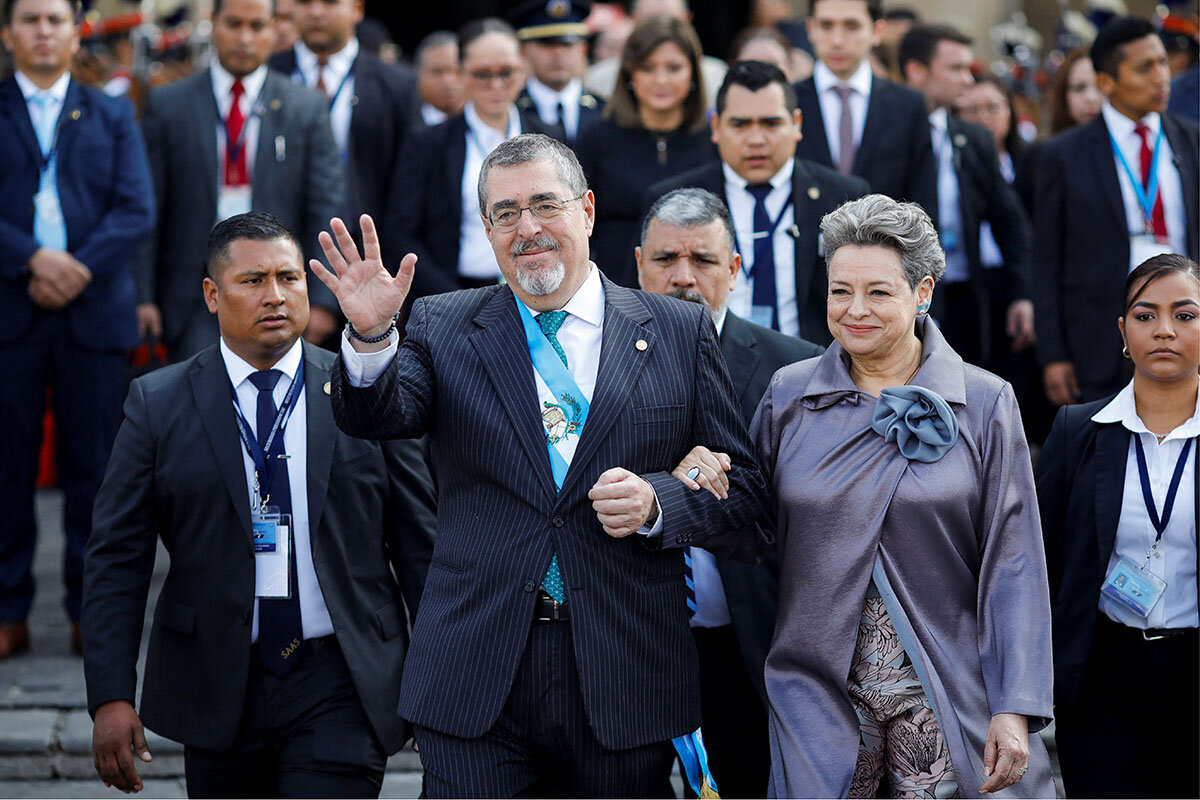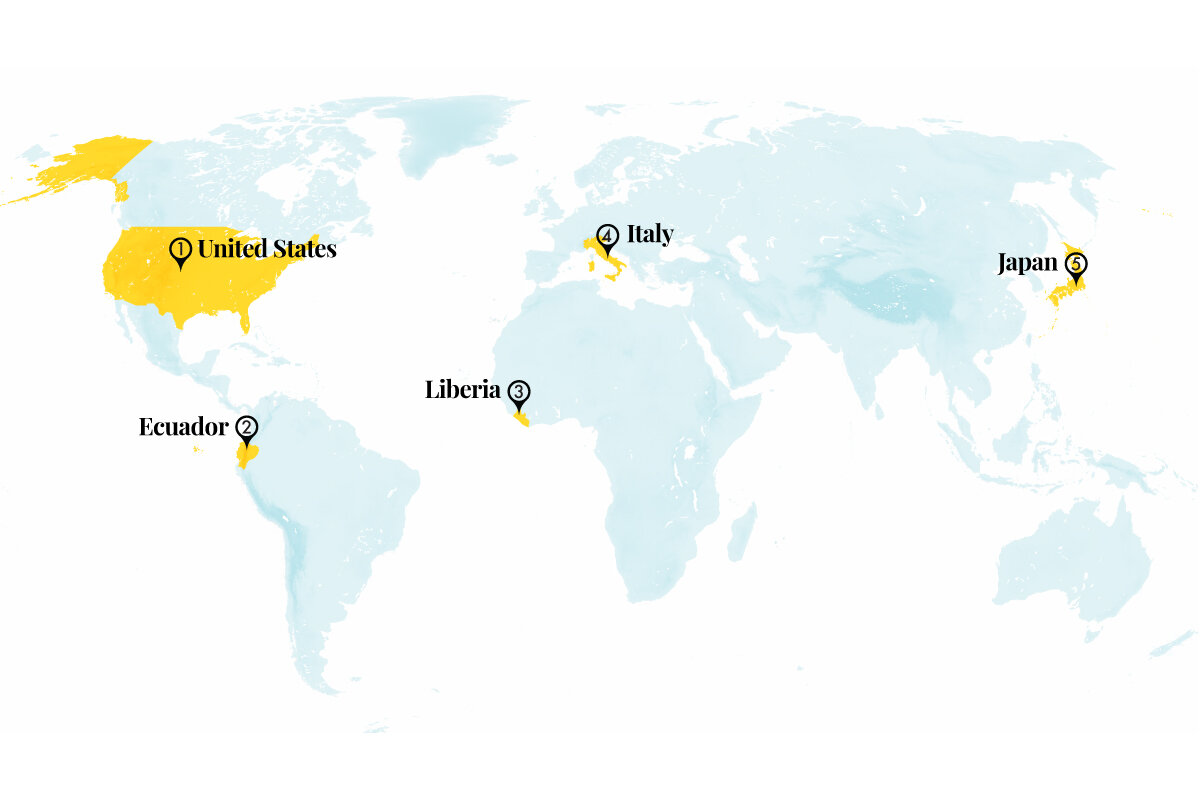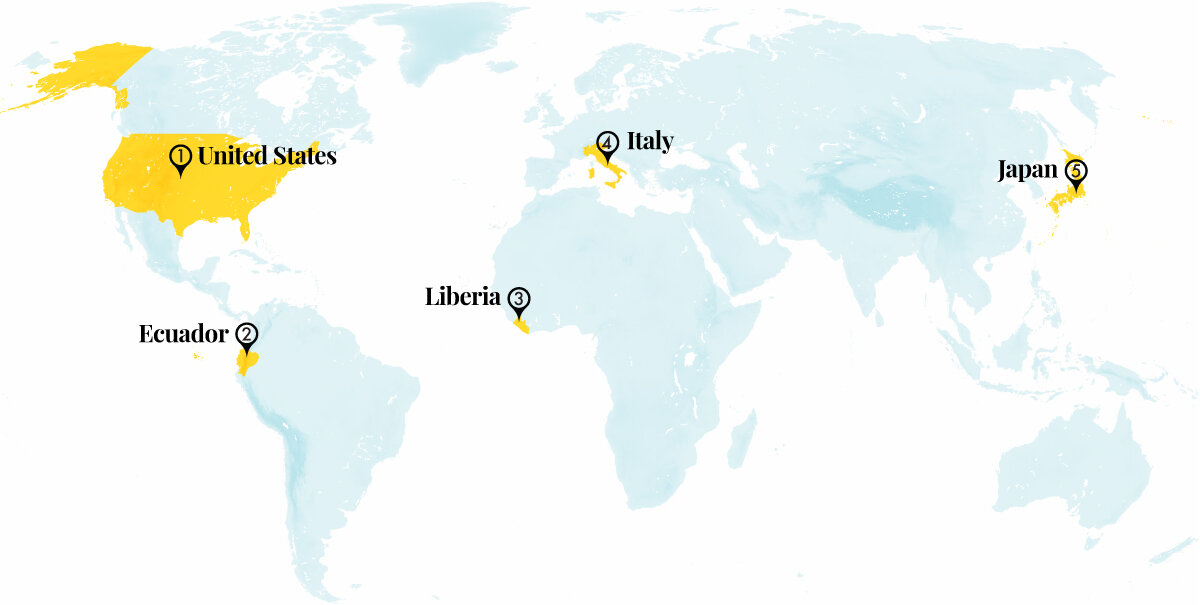There were plentiful reasons for uncertainty in the Iowa caucus results. But even so, Donald Trump underscored his sway over GOP voters.

Why is Christian Science in our name?
Our name is about honesty. The Monitor is owned by The Christian Science Church, and we’ve always been transparent about that.
The Church publishes the Monitor because it sees good journalism as vital to progress in the world. Since 1908, we’ve aimed “to injure no man, but to bless all mankind,” as our founder, Mary Baker Eddy, put it.
Here, you’ll find award-winning journalism not driven by commercial influences – a news organization that takes seriously its mission to uplift the world by seeking solutions and finding reasons for credible hope.
Explore values journalism About usMonitor Daily Podcast
- Follow us:
- Apple Podcasts
- Spotify
- RSS Feed
- Download
 Mark Sappenfield
Mark Sappenfield
I confess I’m fascinated by Guatemala and El Salvador right now. As we write today, Guatemala’s new president is a triumph of democratic principles. And as we’ve written before, its neighbor has embraced a populist strongman. What gives?
The Monitor looks at the world to find universal lessons, so I asked our Whitney Eulich, and I learned something. In some ways, she says, voters in each country have “won.” Guatemala faces poverty and inequality. El Salvador faces rampant gang violence. Each president addresses those concerns in his own way.
It reminds us how well democracies reflect voters’ desires, and encourages us to think about that connection more deeply.
Already a subscriber? Log in
Help fund Monitor journalism for $11/ month
Monitor journalism changes lives because we open that too-small box that most people think they live in. We believe news can and should expand a sense of identity and possibility beyond narrow conventional expectations.
Our work isn't possible without your support.
Today’s stories
And why we wrote them
( 6 min. read )
Today’s news briefs
• World Economic Forum kickoff: More than 60 heads of state gather in Davos, Switzerland, to address climate change, conflict, and the rise of artificial intelligence.
• North Korea to rewrite constitution: North Korean leader Kim Jong Un calls for the rewriting of his nation’s constitution to eliminate the idea of reconciliation and shared statehood with South Korea.
• Trump’s second civil trial to begin: Jury selection begins for the E. Jean Carroll trial. She has accused Donald Trump of attacking her sexually in the dressing room of a department store decades ago.
• Elton John achievement: The British singer-pianist won an Emmy on Jan. 15 for “Elton John Live: Farewell From Dodger Stadium.” He joins the elite group of people who have won an Emmy, Grammy, Oscar, and Tony Award.
( 5 min. read )
This weekend’s Taiwan election was cast as a key moment. How closely does the island, with its strong democratic institutions, want to be aligned with mainland China? The clear message was for independence.

( 5 min. read )
Many cities struggle to care for unhoused people. Denver recently met a goal of sheltering people, using hotels and a micro-community. The effort offers hints of progress.
( 5 min. read )
Guatemala inaugurated its new, anti-corruption president following months of meddling. The turbulence fostered new levels of public involvement in politics.
Points of Progress
( 5 min. read )
In our progress roundup, the tragedy of one femicide coincided with the popularity of an Italian film about domestic violence, leading quickly to new laws. And in Ecuador, a court ruling in favor of one Indigenous group could lead to more land rights for others.
The Monitor's View
( 2 min. read )
Nearly 3,000 leaders in politics and big business are meeting once again this week in the Swiss alpine village of Davos for the World Economic Forum. The official theme is “Rebuilding Trust” – although networking really drives this wintry assemblage. The theme is hardly a new one to the Davos elite. According to global surveys, trust in major institutions or industries has been in steady decline except for one notable example – business.
In 21 countries, trust in business has risen from 48% in 2012 to 61%, according to a 2023 survey by the marketing firm Edelman. Polls in the United States paint an even finer picture. Sixty-five percent of Americans put “quite a lot of confidence” in small business – more trust than in the military, police, medical system, or organized religion, according to Gallup. Overall, public confidence in key institutions has fallen by nearly half since 1979, from 48% to 26% last year.
Among the more than 33 million small businesses in the U.S., many have learned that values such as credibility, transparency, and accountability are critical to maintaining customers and suppliers. “When you are consistent and stay true to these values, it fosters understanding and empathy with your customers,” wrote software entrepreneur René Lacerte in Fast Company magazine last year. “In turn, this strengthens the bonds of trust between you and your customer.”
While trust in small business has long been high, customer reviews on social media have helped keep owners in line. “A business’s reputation is like a delicate Jenga tower, where one wrong move can send it toppling,” wrote entrepreneur Jack Trent in AllBusiness.com.
An incentive for positive feedback online seems to be working. Applications for new small businesses in the U.S. surged last year, setting a record of 5.5 million. That would not have happened without the prospect of shared moral behavior between startups and those they serve.
Such news about American startups may be an important lesson for the elite leaders at Davos and elsewhere. “The truth is, we don’t know how people learn and transmit social trust at the micro-level,” wrote Kevin Vallier, a philosophy professor at Bowling Green State University, in the digital magazine Psyche.
The author of the 2020 book “Trust in a Polarized Age,” Dr. Vallier suggests that trust first be defined as that between individuals – or the kind found in small businesses. Then trust can then be scaled up “in generalized others,” or the institutions of society. Perhaps the Davos attendees keep returning to trust as a theme simply because the informality of the gathering itself seems so, well, entrepreneurial.
A Christian Science Perspective
Each weekday, the Monitor includes one clearly labeled religious article offering spiritual insight on contemporary issues, including the news. The publication – in its various forms – is produced for anyone who cares about the progress of the human endeavor around the world and seeks news reported with compassion, intelligence, and an essentially constructive lens. For many, that caring has religious roots. For many, it does not. The Monitor has always embraced both audiences. The Monitor is owned by a church – The First Church of Christ, Scientist, in Boston – whose founder was concerned with both the state of the world and the quality of available news.
( 4 min. read )
Considering our nature as God’s children can lift us to new heights of inspiration and bring healing.
Viewfinder
Palestinian children play during the Eid al-Adha holiday, in Gaza City, June 6, 2025.

A look ahead
Thank you for joining us today. Tomorrow, we’ll look at the U.S. Congress as it punts a third time this fiscal year on coming up with a budget. Why has the budget process become so broken, how much is that contributing to record national debt, and what are the possible solutions?








